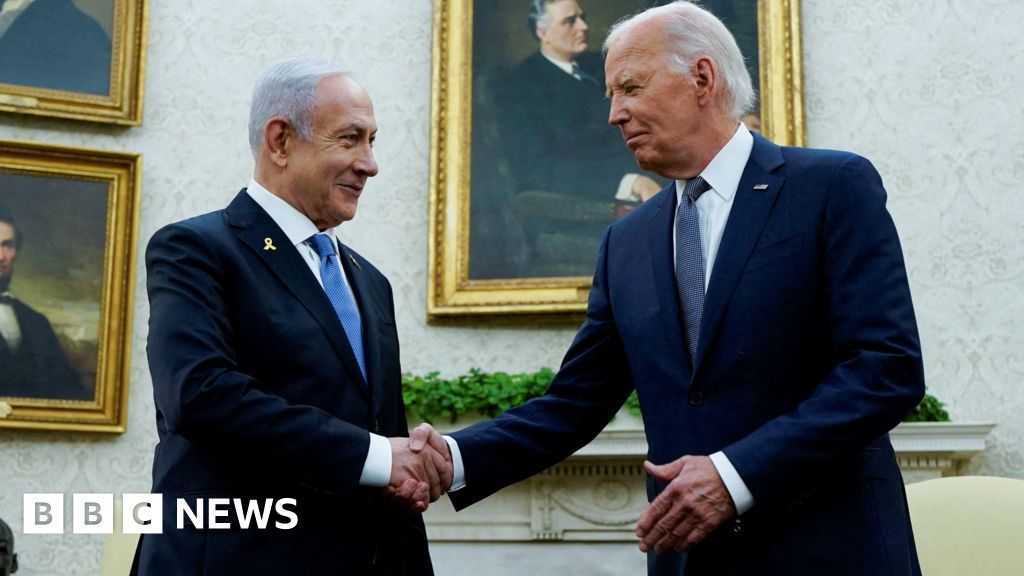Biden and Netanyahu discuss Gaza truce talks as momentum builds

US President Joe Biden and Israeli Prime Minister Benjamin Netanyahu have spoken by phone – in Biden’s final week in office – as momentum builds towards a Gaza ceasefire and hostage release deal.
Israel and Hamas are understood to be making progress but uncertainty remains over key aspects of the potential agreement.
The White House said Biden discussed the “fundamentally changed regional circumstances” following Israel’s ceasefire with Hezbollah in Lebanon, the fall of the Assad regime in Syria, and the weakening of Iran’s power in the region.
Netanyahu’s office said he had updated Biden on instructions he had given to senior negotiators in Doha “in order to advance the release of the hostages”.
During Sunday’s call, which was the first to be publicly announced since October, Biden “stressed the immediate need for a ceasefire in Gaza and return of the hostages with a surge in humanitarian aid enabled by a stoppage in the fighting under the deal”.
It came a day after Netanyahu sent a top Israeli security delegation, including the directors of the Mossad spy agency and Shin Bet security service, to indirect negotiations in Qatar’s capital mediated by Qatari, US and Egyptian officials.
Israeli media reported that Netanyahu was meeting members of his cabinet opposed to a ceasefire deal to persuade them not to resign.
And UK Foreign Secretary David Lammy met his Israeli counterpart in Jerusalem to discuss progress on a deal.
On Saturday, Donald Trump’s Middle East envoy Steve Witkoff met the Israeli prime minister amid efforts to try to reach a deal before the president-elect’s inauguration on 20 January.
Trump has previously said that “all hell would break loose” if the hostages were not released before he returned to the White House.
Last Thursday, US Secretary of State Antony Blinken said an agreement was “very close” and that he hoped to “get it over the line” before Trump took office. Any deal would be based on the proposals Biden set out in May, he added.
Despite the apparent heightened activity, a lack of clarity on several key issues – including whether an initial truce will lead to a permanent ceasefire and whether the Israeli military will agree to fully withdrawing from Gaza – remain.
Anshel Pfeffer, Israel correspondent for The Economist, said he was doubtful that a deal would be achieved quickly.
“We’ve been here so many times before,” he told the BBC’s Today Programme.
“There is a bit more room for optimism, but until there is an official announcement or a truce or ceasefire and we start seeing hostages coming out, I’m going to remain sceptical.”
But he added that it was in both Israel and Hamas’s interest to strike a deal before Trump entered office.
“There is a fear [from Hamas] that Trump will somehow give Israel permission to unleash devastation that hasn’t yet been unleashed on Gaza.”
“Both sides feel so invested, they’ve suffered so much.”
The war was triggered by Hamas’s attack on southern Israel on 7 October 2023, in which about 1,200 people were killed and 251 others taken back to Gaza as hostages. Israel launched a military offensive in Gaza to destroy Hamas in response.
Gaza’s Hamas-run health ministry says more than 46,500 people have been killed during the war.
Israel says 94 of the hostages remain in Gaza, of whom 34 are presumed dead, as well as another four Israelis who were abducted before the war, two of whom are dead.
Related
Qatar emphasizes importance of reaching agreement between US, Iran
CAIROQatar's Prime Minister Sheikh Mohammed bin Abdulrahman Al-Thani stressed the critical need for an agreement between the US and
International Women’s Day: Seeking a Balance with Ghada Al Subaey
1309’s Ghada Al Subaey of Qatar celebrates the many layers of femininity in her recent drop, called Labyrinth of Light. This International Women’s Day, the
Discover Ooredoo Plans and Services in Qatar
Ooredoo is the household name in the field of telecommunications and provides a full portfolio of telecom services: mobile plans for everyone, home
What Will The Imminent Qatar Airways Widebody Order Include?
Which Airline Alliance Do You Prefer To Fly With?












